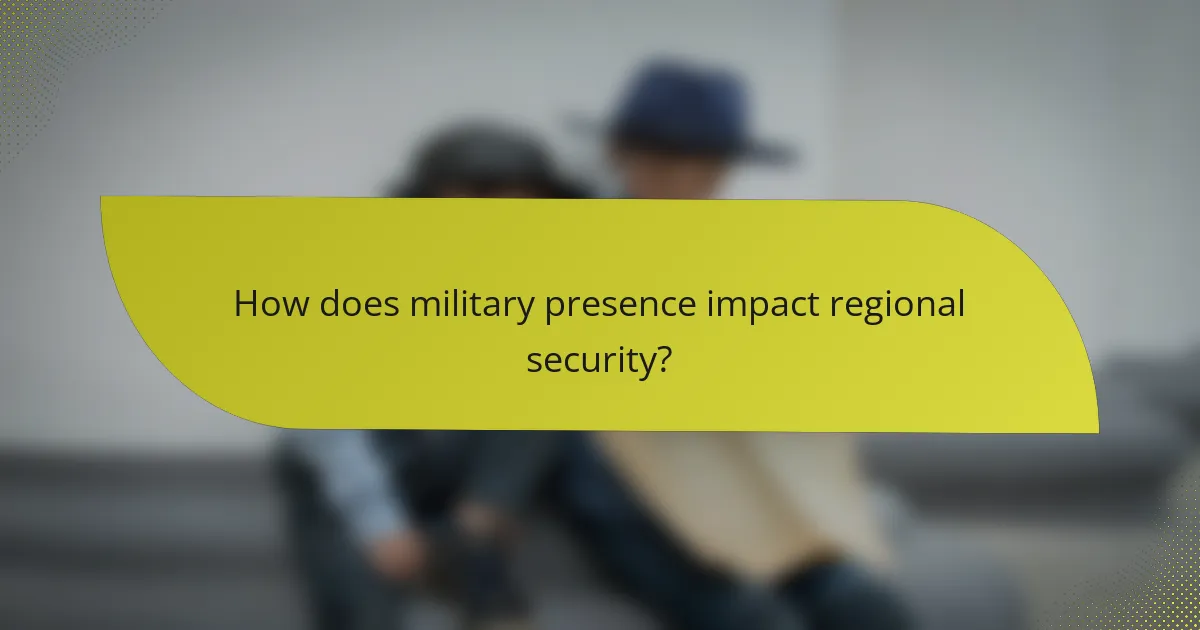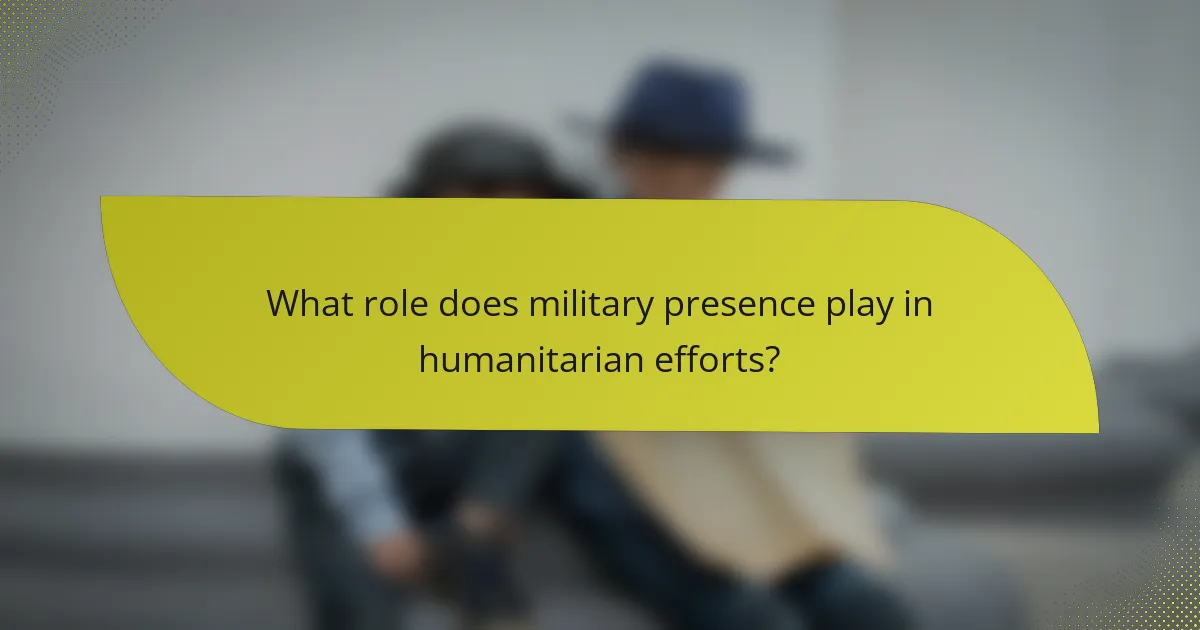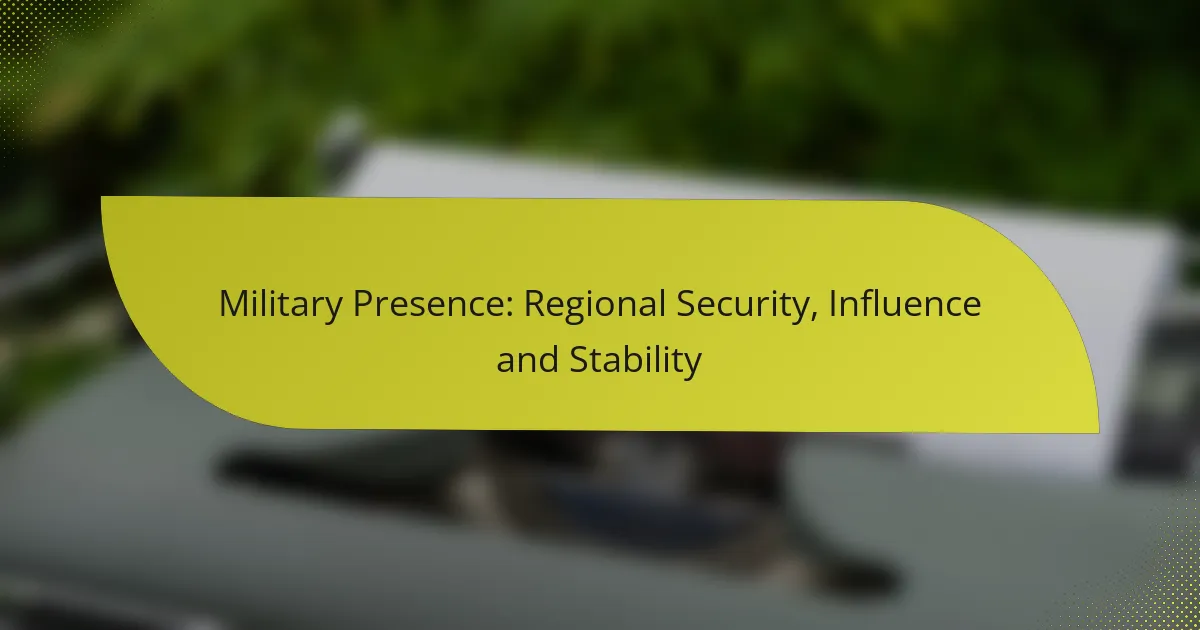The military presence of a nation plays a crucial role in enhancing regional security by deterring potential threats and stabilizing areas prone to conflict. This strategic positioning not only fosters safety among allied nations but also influences international relations, shaping perceptions of power and diplomacy. Key factors such as geopolitical interests and historical alliances drive the deployment of military forces, ultimately affecting regional stability and influence.

How does military presence impact regional security?
Military presence significantly enhances regional security by deterring potential aggressors and stabilizing conflict-prone areas. It fosters a sense of safety among allied nations and can lead to a more predictable geopolitical environment.
Deterrence of aggression
A strong military presence acts as a deterrent against hostile actions from neighboring states or non-state actors. When potential aggressors perceive a credible military threat, they are less likely to engage in aggressive behavior, reducing the likelihood of conflict.
For example, U.S. military bases in Europe have historically deterred aggression from adversaries by signaling commitment to regional allies. This deterrence is most effective when military capabilities are visible and well-publicized.
Stability in conflict zones
Military presence can stabilize regions experiencing conflict by providing security and humanitarian assistance. Troops can help maintain order, protect civilians, and facilitate the delivery of aid, which is crucial in war-torn areas.
In places like Afghanistan and Iraq, international forces have played a key role in stabilizing local governments and supporting reconstruction efforts. However, the effectiveness of military presence in these contexts often depends on the level of local cooperation and the clarity of mission objectives.
Support for allied nations
Military presence strengthens alliances by providing direct support to allied nations, enhancing their defense capabilities. This support can include joint training exercises, intelligence sharing, and logistical assistance, which collectively improve the readiness of allied forces.
For instance, NATO’s presence in Eastern Europe has bolstered the defense posture of member states against potential threats. Such alliances are crucial for maintaining regional security and ensuring collective defense commitments are met.

What are the key factors influencing military presence?
Key factors influencing military presence include geopolitical interests, economic partnerships, and historical alliances. These elements shape how nations position their military forces to enhance security, exert influence, and maintain stability in specific regions.
Geopolitical interests
Geopolitical interests are critical in determining military presence, as nations often deploy forces to secure strategic locations or resources. For instance, countries may establish bases in regions rich in oil or near critical shipping lanes to protect their economic interests and ensure access to vital supplies.
Additionally, military presence can serve as a deterrent against potential adversaries. Nations may increase their troop levels in response to perceived threats, aiming to project power and influence in a region. This dynamic often leads to a balance of power where military positioning can prevent conflicts.
Economic partnerships
Economic partnerships significantly influence military presence, as countries often align their defense strategies with trade agreements and economic ties. For example, nations may collaborate on defense initiatives, sharing resources and technology to enhance their military capabilities while also bolstering economic relations.
Furthermore, military cooperation can enhance trade security, ensuring that supply chains remain intact. Countries with strong economic ties may be more inclined to support each other militarily, leading to joint exercises and shared bases that strengthen both defense and economic stability.
Historical alliances
Historical alliances play a vital role in shaping military presence, as long-standing partnerships often dictate where forces are stationed. Alliances like NATO exemplify how historical ties can lead to collective defense agreements, resulting in the deployment of troops in member countries for mutual security.
These alliances can also influence military funding and resource allocation, as nations prioritize defense spending in regions where they have established partnerships. Understanding these historical contexts is essential for analyzing current military strategies and deployments.

How does military presence affect international relations?
Military presence can significantly influence international relations by shaping perceptions of security, power dynamics, and diplomatic interactions. Countries with a strong military footprint often enhance their influence and can foster alliances, but this presence can also provoke tensions with rival nations.
Strengthening diplomatic ties
Military presence can bolster diplomatic relationships by demonstrating commitment to allies and regional stability. For example, joint military exercises and training programs can enhance cooperation and trust among nations, leading to stronger political and economic partnerships.
Additionally, countries hosting foreign troops often receive security guarantees and military aid, which can further solidify alliances. This mutual support can create a framework for addressing shared challenges, such as terrorism or humanitarian crises.
Creating tensions with adversaries
Conversely, a military presence can escalate tensions with rival nations, leading to an arms race or increased hostilities. For instance, the deployment of troops near contentious borders can be perceived as a threat, prompting adversaries to respond with their own military enhancements.
Moreover, the establishment of military bases in strategic locations can provoke backlash from neighboring countries, potentially destabilizing the region. It is crucial for nations to balance their military strategies with diplomatic efforts to mitigate these tensions and avoid conflict.

What role does military presence play in humanitarian efforts?
Military presence significantly enhances humanitarian efforts by providing logistical support, security, and resources during crises. This involvement can lead to quicker response times and more effective aid distribution in affected areas.
Disaster response capabilities
Military forces are often equipped with specialized training and equipment that enable rapid disaster response. They can deploy search and rescue teams, medical units, and logistical support to areas impacted by natural disasters, such as earthquakes or floods.
For instance, in the aftermath of a hurricane, military personnel can assist in clearing debris, restoring communication lines, and delivering essential supplies like food and water. Their ability to operate in challenging environments makes them invaluable during emergencies.
Support for peacekeeping missions
Military presence plays a crucial role in supporting peacekeeping missions, which often include humanitarian components. Troops can help maintain security in volatile regions, allowing humanitarian organizations to operate safely and effectively.
In conflict zones, military forces can protect aid workers and facilitate the distribution of relief supplies. This support is essential for ensuring that humanitarian assistance reaches those in need without interference from hostile elements.

How does military presence influence local economies?
Military presence can significantly impact local economies by creating jobs, stimulating business growth, and influencing overall economic stability. The influx of military personnel and associated activities often leads to increased demand for goods and services, which can benefit various sectors.
Job creation in defense sectors
The presence of military installations typically leads to job creation in defense-related sectors, including manufacturing, logistics, and maintenance services. These jobs can range from low-skill positions to highly specialized roles, providing opportunities for a diverse workforce.
For example, a military base might require local contractors for construction projects, maintenance of facilities, and supply chain management, leading to the creation of hundreds of jobs. This can be particularly beneficial in regions with limited employment options.
Impact on local businesses
Local businesses often experience a boost from military presence as service members and their families contribute to the local economy through spending. Restaurants, retail shops, and service providers may see increased patronage due to the influx of military personnel.
Moreover, businesses may adapt their offerings to cater to the needs of military families, such as providing specialized services or products. However, reliance on military spending can pose risks; economic downturns or base closures can lead to sudden declines in revenue for these businesses.

What are the risks associated with military presence?
Military presence can lead to various risks, including heightened tensions and potential conflicts, as well as challenges in resource allocation. Understanding these risks is crucial for assessing the overall impact of military operations on regional security and stability.
Escalation of conflicts
The presence of military forces can escalate existing conflicts or create new ones, particularly in volatile regions. For instance, when one country increases its military presence, neighboring nations may feel threatened, prompting them to bolster their own military capabilities, which can lead to an arms race.
Additionally, military exercises or operations can be misinterpreted as aggressive actions, further inflaming tensions. To mitigate this risk, clear communication and transparency about military intentions are essential.
Resource allocation issues
Military presence often diverts resources from essential public services, impacting local economies and development. Governments may prioritize military spending over healthcare, education, or infrastructure, leading to social unrest and dissatisfaction among citizens.
Moreover, the allocation of resources for military operations can strain budgets, particularly in countries with limited financial capacity. It is important for policymakers to balance military needs with the welfare of the civilian population to maintain stability.
